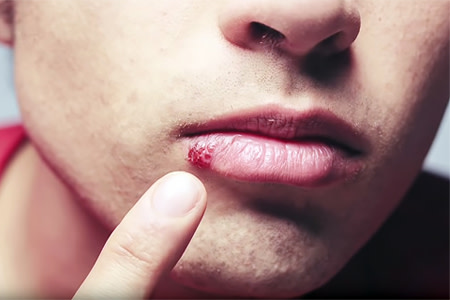A cold sore or fever blister can be undesirable if one develops on your lip or mouth. The herpes simplex virus type 1 (HSV-1) triggers these lesions, which commonly appear close to the mouth. In most cases, a sore can be itchy or painful, but several remedies and medications can manage the condition.
Cold sores can be considered widespread. Many have been infected with the virus responsible for triggering cold sores. However, most don’t develop such lesions or other symptoms. Generally, cold sores are likely to recur several times a year or only once or twice in a lifetime, but it varies from person to person.
Individuals from all age groups can end up with an infection with the herpes simplex virus that causes cold sores. In most cases, exposure to the virus happens during childhood. A person can develop a cold sore at any age, but the chances of acquiring it diminish by the time they reach 35 years of age.
A Close Look At Cold Sores
The initial symptoms of a developing cold sore include itchiness, tingling, or burning sensation. A sore will likely develop after 48 hours of contact with the virus. In most cases, a cold sore will heal within one to two weeks. Although there’s no available cure and the sores heal independently, several measures will help hasten the healing process.
If you have a cold sore, always wash your hands after touching it. Remember that the fluid within the blister is highly infectious. Aside from frequent hand washing, you should also avoid sharing toothbrushes, cutlery, towels, or other personal items.
Remedies For Cold Sores
Managing the symptoms of a cold sore should be your priority as it runs its course. Although cold sores will eventually vanish, there are ways to promote rapid healing. Here are some of the recommended remedies for cold sores worth considering.
- Laser Therapy
Laser therapy may be worth considering if you don’t want to go through the pain and discomfort that a cold sore can cause. Most clinics utilize a low-intensity laser to manage cold sores. Once you notice the indications of a developing cold sore, consider visiting reputable clinics that offer these services. You may also do this at home by using laser devices like Luminance RED for your cold sore. However, it would be best to use one that’s FDA-approved or approved by your doctor.
Laser therapy focuses on the source of the issue, as opposed to other popular treatment options like creams or ointments. Timely administration of the therapy is crucial once you notice signs such as burning, tingling, pain, or itchiness in the suspected area. Laser therapy promotes faster healing and helps minimize discomfort and pain in case a sore has already formed.
- Home Remedies
When you have a cold sore, it can bring about discomfort. If you want to manage the symptoms and minimize the frequency of outbreaks as the sore runs its course, you can try several home remedies. Although these remedies will not deal with the virus, they can help you feel better by easing the symptoms until the cold sore fully heals.
- Prepare a cold compress and position it over the site of the cold sore to help lessen the inflammation. You may do this several times a day.
- Avoid potential trigger foods that trigger irritation, such as citrus fruits, salty or spicy foods, and hot beverages.
- Maintain proper body hydration by drinking plenty of fluids throughout the day.
- Include cool foods such as those you can apply to the mouth area, such as ice chips or popsicles, to lessen the discomfort.
- Apply a lip balm, ideally one with SPF 30, which will serve as a protective layer over the lips until the cold sore fully recuperates. It may be best to apply it throughout the year to prevent cold sores from recurring.
- Dab on a skin protectant product such as petroleum jelly over the cold sore and surrounding skin to prevent dryness and the formation of cracks.
Remember that timely treatment will be the best approach. Once you notice even a slight tingling or burning sensation on your lips or face, consider it a possible warning sign of a developing cold sore. The earlier you control the swelling and treat the cold sore with these measures, such as a cold compress or maintaining proper hydration, the faster it’ll heal.
- Topical Creams And Ointments
Topical creams and ointments may also be options to speed up the healing of cold sores. Some over-the-counter creams and ointments, such as benzocaine or lidocaine, can control the pain. You can also look for benzyl alcohol or docosanol products since they promote rapid healing as long as they’re used early.
- Prescription Medications
Antiviral drugs may be part of a management regimen for cold sores to fight the herpes simplex virus (HSV). Medications such as acyclovir, penciclovir, valacyclovir, and famciclovir are some examples of these antiviral drugs. In most cases, if you suffer from frequent outbreaks of cold sores, the doctor will likely prescribe these antiviral medications.
Final Thoughts
Even today, there’s no cure for the virus responsible for triggering the formation of cold sores. Due to this, you can always be at risk of developing this virus at some point. Luckily, you have various options to minimize the symptoms and speed up the healing with home remedies, antiviral medications, laser therapy, and topical creams or ointments.
Hi, I am an Author who believes in making the life of their readers interesting with his writing. Writing was always my first interest. Ever since I was a teenager, I was already into writing poems and stories. Today, I have gained a great experience in my work. Check out my work and share your views.

